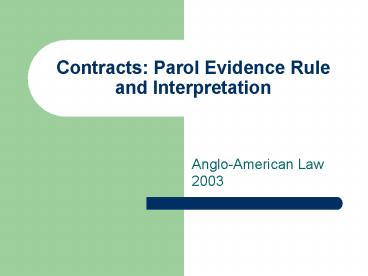Contracts: Parol Evidence Rule and Interpretation
1 / 7
Title:
Contracts: Parol Evidence Rule and Interpretation
Description:
Convey (i.e. transfer title to) land. Suretyship (answering for the debt or default of another) Contracts which by their terms are not to be performed within one year ... – PowerPoint PPT presentation
Number of Views:177
Avg rating:3.0/5.0
Title: Contracts: Parol Evidence Rule and Interpretation
1
Contracts Parol Evidence Rule and Interpretation
- Anglo-American Law 2003
2
Which contracts must be in writing? (Statute of
Frauds)
- Convey (i.e. transfer title to) land
- Suretyship (answering for the debt or default of
another) - Contracts which by their terms are not to be
performed within one year - Promise in consideration of marriage
- Contract for sale of goods
3
Parol Evidence Rule I
- Bars evidence relating to terms agreed (orally or
in writing) on prior to integrated writing - Bars evidence of terms agreed on orally at time
of creation of written agreement - Policy encourages complete, clear written
agreements, minimizes disputes. Also - When parties intend a writing to be final and
complete, we should enforce their desire to
supersede all previous written agreements - Writing should be privileged over contemporaneous
oral agreements (discourages perjury).
4
- A total integration that is, a contract which
the parties intend to be final and complete may
not be contradicted or supplemented. - A partial integration (a writing which the the
parties intend to be final but not complete) may
not be contradicted, but may be supplemented by
additional terms.
5
How to tell whether Integration is Total
- Merger Clause
- Contract appears to be total integration, but no
merger clause. - Willistons view would it have been natural
for the parties to have negotiated a side
agreement? - If no, contract is total integration, and no
parol evidence admissible. - If yes, additional terms which are consistent may
be supplied by parol evidence. - Note Parol Evidence Rule does not bar evidence
of subsequent agreements supported by independent
consideration
6
Interpretation Rules Part I
- Applied in 2 settings
- ascertain whether a proposed additional term is
contradictory/complementary (for statute of
frauds purposes - Resolve disputes over meaning of contract terms
7
Interpretation Rules Part II
- Plain meaning
- Course of dealing/course of performance
- Usage of trade
- Under modern common law, course of dealing and
trade usage can trump plain meaning - U.C.C. changes this.































